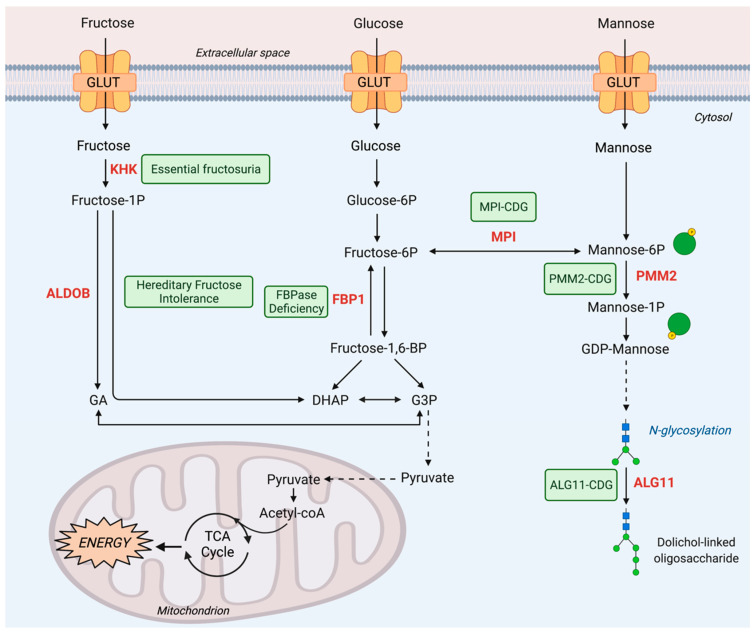Figure 1.
Fructose and mannose inborn errors of metabolic disease. A number of inborn errors are related to perturbed sugar metabolism, including fructose and mannose. Fructose and mannose transport occurs through glucose transporters due to their similarity in structure. Essential fructosuria and hereditary fructose intolerance affect fructolysis through deficiency in KHK and ALDOB, respectively. These pathways feed into the glycolysis pathways through GA to G3P conversion and DHAP production. FBPase deficiency affects fructose metabolism by loss of FBP1 activity blocking gluconeogenesis. Mannose metabolism, which is linked to fructose metabolism by the enzyme MPI, is also subject to mutations causing inborn errors. The central role of mannose in glycosylation explains the inborn errors classified as congenital disorders of glycosylation. MPI-CDG, PMM2-CDG, and ALG11-CDG relate to the deficiency of the enzyme listed in their names causing hypoglycosylation. These changes affect proper protein folding, leading to aberrant cellular function. Types of inborn errors of metabolism are shown in light green boxes. Proteins: GLUT, Glucose transporter; KHK, Ketohexokinase; ALDOB, Aldolase B; FBP1: Fructose-1,6-bisphosphatase 1; MPI: Mannose phosphate isomerase; PMM2: Phosphomannomutase 2; ALG11: GDP-Man:Man3GlcNAc2-PP-dolichol-alpha1,2-mannosyltransferase; Metabolites: GA; Glyceraldehyde; DHAP: Dihydroxyacetone phosphate; Fructose-1P: Fructose-1-phosphate; Glucose-6P: Glucose-6-phosphate; Fructose-6P: Fructose-6-phosphate; Fructose-1,6BP: Fructose-1,6-bisphosphate; Mannose-6P: Mannose-6-phosphate; Mannose-1P: Mannose-1-phosphate; GDP-mannose: Guanosine diphosphate mannose; G3P, Glyceraldehyde-3-phosphate; Pathways: TCA, tricarboxylic acid; Disease: CDG: Congenital disorders of glycosylation.

